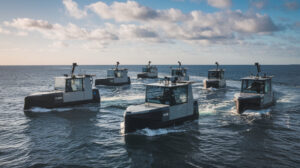The Autonomous Vessels Market is witnessing rapid growth, driven by advancements in artificial intelligence (AI), navigation technologies, and increasing demand for unmanned maritime solutions. As automation becomes integral to modern shipping operations, autonomous vessels are set to transform the global maritime industry. Governments, defense organizations, and commercial shipping companies are investing in autonomous technology to enhance safety, efficiency, and operational effectiveness.
Market Dynamics Driving the Growth of Autonomous Vessels Market
The Autonomous Vessels Market is experiencing growth due to several key factors. The rising need for efficient and cost-effective shipping operations is prompting the adoption of autonomous vessels. Reduced human errors, improved fuel efficiency, and lower operational costs are some of the advantages propelling demand. Increasing maritime security concerns are fostering the development of unmanned surface vessels (USVs) for defense applications.
The integration of AI, IoT, and big data analytics in autonomous ships is enhancing real-time decision-making capabilities, further accelerating the adoption of autonomous maritime solutions. Countries with extensive coastlines are heavily investing in smart shipping solutions to optimize their maritime logistics. The need for remote-controlled and fully autonomous vessels in both commercial and military applications is driving substantial investments in research and development.
Download PDF Brochure: https://www.marketsandmarkets.com/pdfdownloadNew.asp?id=222340429
Technological Advancements Transforming the Autonomous Vessels Market
Autonomous vessels are equipped with sophisticated navigation, communication, and collision avoidance systems that enable them to operate with minimal human intervention. Sensor fusion technology, machine learning algorithms, and AI-based route optimization are improving autonomous vessel performance. Developments in remote-control systems and edge computing technologies are also enhancing real-time data processing capabilities, allowing for safer and more efficient operations.
Advancements in autonomous maritime technology have enabled the deployment of different levels of automation, from semi-autonomous to fully autonomous vessels. Innovations in electric propulsion, renewable energy integration, and alternative fuels are also shaping the future of autonomous shipping, aligning with global sustainability goals.
Commercial Applications Fueling the Demand for Autonomous Vessels Market
The Autonomous Vessels Market is seeing increased adoption across multiple sectors. In the commercial shipping industry, companies are exploring autonomous vessels for cargo transportation to reduce operational costs and enhance efficiency. Autonomous ferries are being deployed in several regions to improve passenger transportation.
The offshore energy sector is leveraging autonomous vessels for survey operations, underwater inspections, and logistics support. Oil and gas companies are integrating unmanned surface and underwater vessels to improve the safety and efficiency of offshore exploration activities. The growing need for oceanographic research and environmental monitoring is also contributing to the expansion of autonomous vessels in scientific applications.
Defense and Security Applications Boosting the Autonomous Vessels Market
The Autonomous Vessels Market is gaining significant traction in the defense and security sector. Navies across the world are investing in unmanned surface vessels for surveillance, reconnaissance, and mine countermeasure operations. Autonomous vessels equipped with AI-driven threat detection and countermeasure capabilities are becoming crucial assets for modern naval forces.
Governments are funding defense programs to develop autonomous maritime solutions that enhance naval capabilities while reducing human risk. The integration of unmanned surface vessels with autonomous underwater vehicles (AUVs) is further strengthening maritime defense operations.
Regulatory Challenges and Future Roadmap for Autonomous Vessels Market
Despite the rapid advancements, the Autonomous Vessels Market faces regulatory challenges. Maritime laws and international regulations need to be adapted to accommodate autonomous vessel operations. Issues related to cybersecurity, liability in case of accidents, and ethical concerns regarding AI decision-making in maritime environments require clear regulatory frameworks.
Several organizations, including the International Maritime Organization (IMO), are working on guidelines to ensure the safe integration of autonomous vessels into global shipping networks. As regulatory bodies establish frameworks for autonomous maritime operations, the market is expected to witness accelerated adoption.
Regional Market Insights for Autonomous Vessels Market Growth
North America and Europe are leading the Autonomous Vessels Market due to high investments in maritime automation and strong regulatory frameworks. The United States, Norway, and the United Kingdom are at the forefront of autonomous vessel development.
Asia-Pacific is emerging as a key region for market growth, with countries like China, Japan, and South Korea investing heavily in smart shipping initiatives. The presence of major shipbuilding companies and increasing maritime trade activities are contributing to regional market expansion.
The Middle East and Africa are also witnessing growth in autonomous vessel adoption, particularly in offshore energy applications. Investments in autonomous surveillance and security systems are further boosting market demand in these regions.
Request Sample Pdf: https://www.marketsandmarkets.com/requestsampleNew.asp?id=222340429
Future Outlook of the Autonomous Vessels Market
The Autonomous Vessels Market is expected to grow significantly in the coming years, driven by technological advancements, increasing investments in smart shipping, and regulatory developments. The integration of AI, IoT, and renewable energy solutions will further enhance the capabilities of autonomous vessels.
As maritime automation continues to evolve, stakeholders across the shipping, defense, and offshore industries will increasingly adopt autonomous vessels to improve operational efficiency and sustainability. The ongoing innovation in autonomous navigation, cybersecurity solutions, and AI-driven maritime analytics will shape the future of the autonomous shipping industry.
The transition toward fully autonomous vessels is inevitable, and companies investing in automation today will be at the forefront of the maritime industry’s future. The next decade will witness the transformation of traditional shipping models as autonomous technology becomes a fundamental part of global maritime operations.


